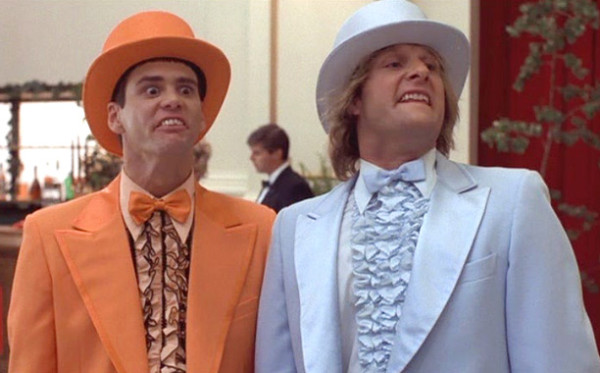The Dunning-Kruger effect
The Dunning-Kruger effect states that incompetent people are also incompetent in assessing their own performance. Therefore, less competent people think their performance is competent, while smarter people focus on their own flaws.
It explains, among other things, how in a society that places too much value on image, idiots and insane people are able to get ahead by overestimating their value and getting fools to agree with them, since fools overestimate their intelligence:
The essence of the Dunning-Kruger effect is that “ignorance more frequently begets confidence than knowledge.” Studies have shown that the most incompetent individuals are the ones that are most convinced of their competence. At work this translates into lots of incompetent people who think they are superstars. And what is worse is that if you have a manager that doesn’t closely supervise work, he or she may judge performance based on outward appearances using information like the confidence with which these incompetent blockheads speak.
An important corollary of this effect is that the most competent people often underestimate their competence. This is a result of how you frame knowledge. The more you know, the more you focus on what you don’t know. For instance, people who can name 15 of the 50 state capitals tend to think “I know 15.” People who know 45 of the 50 state capitals tend to think “I don’t know 5.”
Dunning and Kruger, two researchers at Cornell University, described their findings in a paper entitled “Unskilled and Unaware Of It: How Difficulties In Recognising Ones Own Incompetence Lead To Inflated Self-Assessments” in the Journal of Personality and Social Psychology.
In 1995, McArthur Wheeler walked into two Pittsburgh banks and robbed them in broad daylight, with no visible attempt at disguise. He was arrested later that night, less than an hour after videotapes of him taken from surveillance cameras were broadcast on the 11 o’clock news. When police later showed him the surveillance tapes, Mr. Wheeler stared in incredulity. “But I wore the juice,” he mumbled. Apparently, Mr. Wheeler was under the impression that rubbing one’s face with lemon juice rendered it invisible to videotape cameras (Fuocco, 1996).
We argue that when people are incompetent in the strategies they adopt to achieve success and satisfaction, they suffer a dual burden: Not only do they reach erroneous conclusions and make unfortunate choices, but their incompetence robs them of the ability to realize it. Instead, like Mr. Wheeler, they are left with the mistaken impression that they are doing just fine. As Miller (1993) perceptively observed in the quote that opens this article, and as Charles Darwin (1871) sagely noted over a century ago, “ignorance more frequently begets confidence than does knowledge” (p. 3).
Their conclusions can be summarized this way:
- Incompetent individuals tend to overestimate their own level of skill,
- Incompetent individuals fail to recognize genuine skill in others,
- Incompetent individuals fail to recognize the extremity of their inadequacy,
- If they can be trained to substantially improve their own skill level, these individuals can recognize and acknowledge their own previous lack of skill.
Translation: without leadership at the top of the curve who is willing to call people on their incompetence, the incompetents will appear competent to other incompetents and be advanced, possibly even to the presidency.
This causes a mathematical problem for democracies since most people are not particularly competent at leadership, government or logical argument, meaning they are both unable to assess the best leadership choices and sure that they’re right.
It’s essentially similar to the Downing effect:
The Dunning-Kruger effect is part of a larger group of cognitive effects sometimes referred to as illusory superiority. Other effects in this category create an additional concern for the success of intelligent assistants. For instance, it is known that estimating the intelligence of others is a difficult task (the “Downing effect”) that requires high intelligence.
This explains the tendency of people to be very likely to rate themselves as “above average,” even though not everyone can be so. We might expect that lower-intelligence users would fail to accurately gauge the intelligence of information systems, leading to disuse.
That tendency could go a long way toward explaining why many successful societies have relied on strong leaders who had no problem beating down the incompetent with force. Unless suppressed, the 90% of humanity who per the “Bell Curve” are unskilled and unaware of it will take over and, being incompetent, run society into the ground.
In addition, while people can be taught specific tasks, they cannot be taught to reason in general; education does not raise IQ and in the process of trying, becomes dumbed-down to the point where no one intelligent will get any benefit from it, which discriminates against the intelligent.
When you combine the Bell Curve, the Dunning-Kruger and Downing effects, and the natural tendency of human beings to compromise, you have a working explanation why human societies inevitably begin the pursuit of a “race to the bottom” once they become powerful enough to stop losing so many people to natural events, disease and war.
Tags: class war, crowdism, downing effect, dunning-kruger, dunning-kruger effect, illusory superiority, incompetence, ineptitude, intelligence, IQ, stupidity, the bell curve










